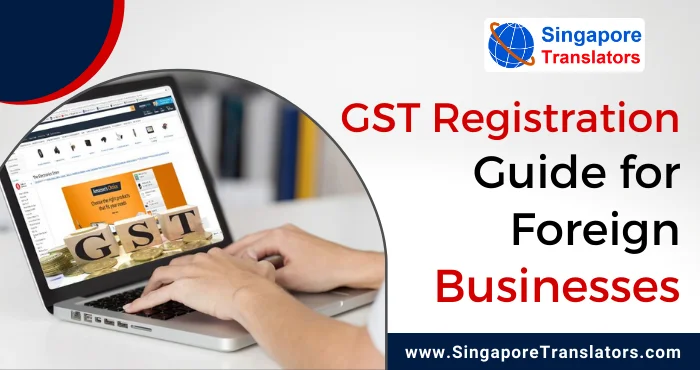Many foreign businesses intend to sell products offer products or services to the various businesses or consumers within Singapore. It’s not simple as it looks like, besides making a strategy and marketing products and services. Each foreign business also needs to keep in mind the impose of Goods and Service Tax (GST) on specific products and services. This article will give you GST Registration for Foreign Businesses in Singapore and the circumstances of charging GST in Singapore, GST registration together with the ways to pay the GST followed by the penalty subjected to the non-payable of tax.

What is GST and how is it Calculated?
GST or Goods and Service Tax (GST) is the consumption tax imposed on almost all the supplied goods and services in Singapore and the goods imported from abroad to Singapore. The Goods and Service Tax (GST) is identical to the value-added tax.
The Goods and Service Tax (GST) is charged in Singapore at the rate of 7% only when the consumers purchase the taxable goods or services from the Goods and Service Tax (GST) registered businesses.
Do You Need to Charge GST When Selling Goods/Services to People in Singapore?
Earlier, the offering goods and services through overseas companies were not accounted for Goods and Service Tax (GST). However, to maintain the Goods and Service Tax (GST) treatment among the local and overseas suppliers that offer products and services to the consumers, abroad businesses will now be required to levy the GST on the export of services to Singapore. This will take effect from 1 January 2020 through Overseas Vendor Registration (OVR) administration.
The overseas vendor registration regime is only for Business-to-Consumer (B2C) that offers imported digital services. However, from 1 January 2023, it will also apply to non-digital services along with low-value goods. This program enables abroad vendors to offer digital services, especially to the non-GST registered individuals and businesses in Singapore and accounted for paying GST on offered services.
In case you are engaging in a Business-to-Business (B2B) supply of services to the GST registered individual or vendors (including companies, sole proprietorship, and partnership) in Singapore. In that case, you do not require to be subjected to GST. But, according to the reverse charge regime, the GST registered vendors that are basically the receiver of the services must pay the GST based on the cost of the imported services.
Get Fast & Accurate official notarization for ICA, MOM, MFA.
Digital services
Digital services consist of the services provided either through any means of electronic network or internet. These digital services are usually facilitated and automated through the use of computers. Few of the common examples of supply of digital services areas:
- Downloadable electronic media (For e.g., installing mobile applications, e-books, and movies);
- Subscription-based services (including news, magazines, streaming of TV shows and music, and online gaming);
- Software programs (for example, installing software, drivers, website filters, and firewalls);
- Electronic data management (For e.g., website hosting, online data warehousing, file-sharing, and cloud storage services); and
- Any additional services provided electronically to assist non-digital transactions (e.g., listing fees, commission, etc.)
Non-digital services
Recently, there was the announcement in Singapore budget 2021 regarding the impose of Goods and Service Tax (GST) on the import of non-digital services. These services include those services that require human intervention and are offered through the internet. In this type of service, the beneficiary does not require to be physically present at the specific location where non-digital services will be provided. For example, hairdressing services.
Few examples of non-digital services include one-on-one live interaction with the overseas service provider of fitness training, counseling, telemedicine, and education learning. The GST will be imposed on non-digital services from 1 January 2023.
Low-value goods
Moving to the physical goods, the Goods and Service Tax (GST) is presently being imposed on the following things:
- The goods that are being imported into Singapore through land or sea
- The goods that are being imported either through air or post whose value exceeds $400 excluding intoxicating liquors and tobacco, for which Goods and Service Tax (GST) are being charged irrespective of its value.
From 1 January 2023, the GST will start to impose on the low-value goods as well, including physical goods whose value is less than $400, which are being imported either through air or post.
Some examples of goods like those purchased from the online shopping platform like Lazada, Shopee, Taobao, ezbuy, and Amazon. However, the overseas suppliers of the goods will need to levy GST upon the sale of such low-value goods from 1 January 2023. However, the GST registered vendors may be accounted for the reverse charge regime, which is also subjected to GST on business to business in the import of low-value goods purchase from the local and overseas suppliers from the same date onwards.
Register for GST
If you are the foreign supplier, you will require registering for Goods and Service Tax (GST) on the prospective basis or retrospective basis, provided that you met the following circumstances:
Compulsory GST registration
The registration process is not complicated but requires filling up some forms and paying fees at various stages. This article will guide you through the steps towards compulsory GST registration in Singapore.
If you want to redomicile a foreign company in Singapore, then there are some steps you have to follow proposed by MOM.
Hire a Language translator for converting your legal & Other Documents.
Retrospective basis:
If the annual turnover of your business in each calendar year (i.e., 1 January – 31 December) exceeds $1 million, in that situation, you will require to register for GST on a retrospective basis; and
If the value of the offered Digital services and low-value goods to the non-GST registered customers is above S$100,000 at the end of each calendar year.
Prospective basis:
- You need to register for Goods and Service Tax (GST) if you think that the annual turnover of your business is expected to exceed S$1 for the next 12 months.
- If you think that the value of your offered low-value goods and digital services to the non-GST registered customer in Singapore is expected to exceed S$100,000 in the next 12 months.
Once you get eligible for the GST registration, you need to apply for GST registration within 30 days of:
- You need to apply for the GST registration by the end of the relevant calendar year on a retrospective basis.
- The specific day when you get eligible for GST registration under the prospective basis.
Voluntary GST registration
If you are a foreign supplier of goods and services but not eligible for GST registration in Singapore, then you can still apply for the voluntary registration GST registration if you wish to do. To apply for voluntary GST registration, you will require to send in writing to Singapore relevant authority, i.e., Inland Revenue Authority of Singapore (IRAS), that you are running a business and intend to:
- Offer the product and services on which tax will be levied if made within Singapore.
- Offers the digital services directly or on behalf of the foreign suppliers to the non-GST registered consumers in Singapore.
- Once the application gets approved, you will require to get registered for at least two years. The Inland Revenue Authority of Singapore has the complete right to Levy any conditions on your GST registration. For example, requesting you to take up the banker’s guarantee.
If you are registering your business for Goods and Service Tax (GST) as a foreign supplier, you will require to be registered under the simplified pay-only regime, which does not grant you to conceal input tax on the taxable goods purchased within Singapore, but this regime will provide you the benefit of simplified GST reporting and documentation requirements.
You can register for Goods and Service Tax (GST) by submitting the online form. Along with the GST application form, you will require to submit several documents:
- A duly signed declaration form filled by director/partner/sole-proprietor
- You need to submit the certificate of incorporation (make sure that the certificate is in the English language. If it is not in the English language, you need to get the certificate translated into English and notarized before filing the application) that consists of the following things:
- Entity name
- Date of incorporation
- Country of incorporation.
You don’t need to hire a local agent to manage all your legal tax matters in Singapore, but you can do so if you wish to hire an agent.
Displaying GST-Inclusive Prices for Buyers from Singapore
Generally, you must have seen that when you buy GST taxable goods, there are GST inclusive prices on all the prices display. This is because most GST-registered businesses display GST inclusive prices on the MRP of the product. Moreover, for the majority of the GST registered businesses that are regulating in the international market, it might not be functional for those businesses to display prices inclusive of Singapore GST. This means the price to display a criterion is not for the overseas business.
How to Pay GST
After you have registered your business for GST as per the simplified pay-only regime, you will be required to file the GST returns regularly. This means you can report the value of the digital services offered and the GST collected in the particular period on a quarterly basis.
After that, you must file the GST returns and payment of the outstanding money within a month following the end of the accounting period. Some of the relevant accounting periods come in between:
- January to March;
- April to June;
- July to September; and
- October to December.
Suppose you are filing the GST returns for the accounting period of April to June, then the deadline for filing and payment of GST would be 31st of July.
Penalties for Not Charging GST
If you are unable to pay the tax by the end of the due date, you will be subjected to a penalty of 5%. Furthermore, if again you are unable to pay the tax for the next 60 days after the due date, then there will be an additional 2% penalty for every month if the tax remains unpaid (you will be subjected to a maximum of 50% for unpaid tax).
Professional assistance for quality translation service
After reading the above article, you might have understood all the basic and essential things related to the applicable Goods and Service Tax (GST) on the offered products and services. However, before proceeding to start providing products and services in Singapore, it is suggested to read each detail carefully and make sure that you do not get subjected to the penalty due to non-payment of tax.
You can reach out to a Singapore translator i.e., a highly reputed translation agency for quick assistance and peace of mind in quality document translation. Our translator takes pride in consistently delivering high-quality legal translation service at a cost-effective price.


